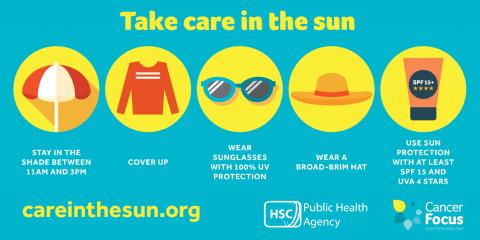Public urged to look out for vulnerable people in hot weather

With temperatures set to rise in the coming days the Public Health Agency (PHA) is urging people to protect themselves from the sun and to look out for older and more vulnerable people.
Although there is no current weather warning for Northern Ireland, like there is in other parts of the UK and Ireland, it is still important to remember that as temperatures creep up, some people can be more susceptible to the heat, and all of us need to protect ourselves from the strong ultraviolet (UV) rays from the sun.
Dr Brid Farrell, Deputy Director of Public Health at the PHA, said: “With hot weather being a rarity here it is understandable that we all want to get out and enjoy the sunshine, but we’re asking people to make sure they’re protecting themselves when they’re out and about and check in on friends and family members.
“It is important to look after older people and those more susceptible to potential health issues in warmer weather. If you have a friend or relative who is less mobile or might need a little help, make sure to check in on them. Help them stay hydrated with regular cold drinks, avoiding alcohol. Help them keep their home cool by shutting curtains if the sun is coming through and opening the windows in the evening or at night when it’s cooler.
“Encourage them to wear light, loose-fitting clothing so they’re not too hot and if you or anyone you know begins to feel sick or dizzy, keep out of the sun and seek medical advice.
“The PHA has also written to care home providers in Northern Ireland with advice and guidance on helping to look after residents during hotter spells of weather.”
Top tips for looking after yourself and others in hot weather:
- try to stay out of the sun, particularly when it is at its highest between 11am and 3pm;
- stock up on supplies like medicines, food and non-alcoholic drinks, so you won’t have to go out in the heat;
- keep your home cool – shutting windows when it's hotter outside than inside may help;
- open your windows at night – when it's cooler;
- keep drinking fluids;
- plan strenuous outdoor activities, like DIY or gardening during cooler parts of the day, like early morning;
- keep alcohol drinking to a minimum – it dehydrates the body;
- avoid heavy and hot food; modify your diet to include plenty of fruit and salad as this helps keep you hydrated;
- use a sun cream with a high sun protection factor - also known as 'SPF' – for protection from the sun's harmful ultraviolet (UV) radiation – SPF 15 or greater is advised with a UVA Rating of at least 4 stars;
- wear light, loose-fitting clothing, such as cotton, so sweat can evaporate;
- if you feel sick or dizzy, keep out of the sun and seek medical advice.
To find more info on staying safe in hot weather visit www.nidirect.gov.uk/articles/hot-weather-advice
Dr Farrell added: “Just because we don’t have an extreme heat weather warning in Northern Ireland, it doesn’t mean that we aren’t at risk from dangerous UV sun rays, even if it’s overcast or cloudy. When the UV index is three or above we need to protect our skin and eyes, so it’s important to know what the UV index is going to be throughout the day.”
The Met Office website at www.metoffice.gov.uk/uv will tell you what the UV levels are in your local area.
To find out more about sun protection, visit www.CareInTheSun.org/sunscreen
Care in the sun advice:
Everyone is at risk of UV damage, but certain groups are particularly at risk including babies and children, those with fair hair and skin, outdoor workers and people with a family history of skin cancer. Just one episode of sunburn, especially in childhood, can double the lifetime risk of malignant melanoma, the most serious form of skin cancer. Keep an eye on the weather forecast and visit the Met Office website for the up-to-date UV Solar Index.
There are practical steps we can take to protect our skin and eyes:
- use sunscreen with a minimum of SPF 15 for UVB protection and UVA 4-stars;
- seek shade when the UV rays are strongest between 11am and 3pm;
- cover up in the sun with a long sleeved t-shirt and a broad brim hat;
- wear sunglasses that have CE or British Standard Marks which carry a UV 400 label and offer 100% UV protection. This will ensure they provide adequate protection from both UVA and UVB;
- sunglasses should fit your face well and relatively snugly so that light doesn't enter your eye from around the lens.
- use at least six full teaspoonfuls of sunscreen lotion are needed for an all over body application for an average adult, which is more than half a teaspoon of sunscreen to each arm, over half a teaspoon for the face and neck (including the ears), and just over one teaspoon for the front of your body, just over one teaspoon for the back of your body, and just over one teaspoon for each leg;
- to give a good level of protection, sunscreen needs to be applied generously 30 minutes before you go outdoors, then reapplied every two hours or more frequently after swimming, sweating, or towelling the skin.
